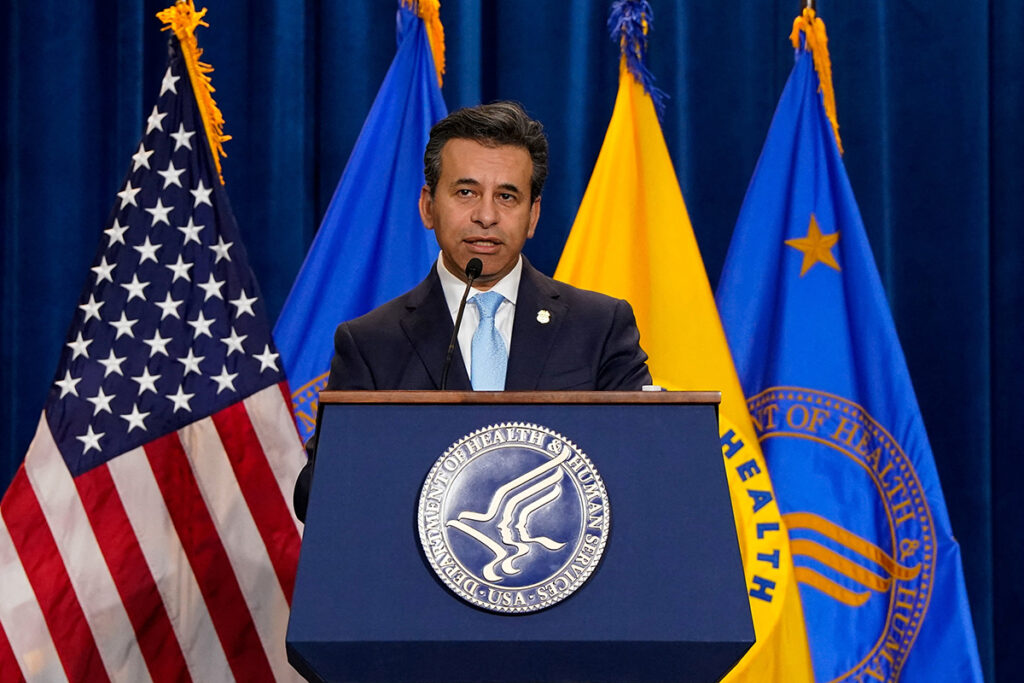WASHINGTON (OSV News) — As the Trump administration continued facing political controversy over its handling of documents surrounding the Jeffrey Epstein case, Deputy Attorney General Todd Blanche conducted an interview with Epstein’s convicted accomplice Ghislaine Maxwell.
The same week in Washington, President Donald Trump signed an executive order aiming to give cities and states more authority to remove people experiencing homelessness from the streets; Food and Drug Administration Commissioner Marty Makary said he has “no preconceived plans” to change policy regarding mifepristone, a drug used for both abortion and some early miscarriage protocols; and a new report said the State Department has drafted plans to end PEPFAR, the U.S. government’s global effort to combat HIV/AIDS.
Maxwell Interviewed As Trump Allies Push for Information
As Trump allies continued to push the administration to release documents in the sex-trafficking investigation into Epstein, a multimillionaire who was found dead in prison of an apparent hanging in 2019, Trump has sought to distance himself from the late former financier, with whom he reportedly had a falling out in 2004.
Amid the controversy, Blanche interviewed Maxwell on July 24 and again on July 25, who is currently serving a 20-year sentence in prison after being convicted on sex trafficking charges for recruiting and grooming minor girls to be sexually abused by Epstein.
“The Department of Justice will share additional information about what we learned at the appropriate time,” Balance said on X.

Amid the Epstein drama, Catholic advocates have called on Congress to strengthen efforts to prevent sex trafficking.
Representatives of the Alliance to End Human Trafficking and the National Advocacy Center of the Sisters of the Good Shepherd have advocated Congress take action on three bills to fight trafficking: the Frederick Douglass Trafficking Victims Prevention and Protection Reauthorization Act (H.R. 2961), a reauthorization of the Trafficking Victims Protection Act first adopted in 2000; the Trafficking Survivors Relief Act (H.R. 1379), which would vacate and expunge convictions of trafficked persons who committed nonviolent crimes, such as participating in identity fraud or selling drugs; and The Kids Online Safety Act (S.1748), which specifies a “duty of care” for online platforms, saying they “shall exercise reasonable care in the creation and implementation of any design feature to prevent and mitigate” harms to minors.
Trump Order Aimed at Removing People Suffering Homelessness from Streets
Trump on July 24 signed an executive order titled, “Ending Crime And Disorder On America’s Streets,” directing the attorney general to attempt to reverse federal and state judicial precedents to make it easier for local governments to remove people experiencing homelessness from encampments into treatment centers.
“Shifting homeless individuals into long-term institutional settings for humane treatment through the appropriate use of civil commitment will restore public order,” the order said. “Surrendering our cities and citizens to disorder and fear is neither compassionate to the homeless nor other citizens.”
The National Homelessness Law Center issued a statement July 24 condemning the order, arguing it “deprives people of their basic rights and makes it harder to solve homelessness.”
“This order does nothing to lower the cost of housing or help people make ends meet,” the statement said. “The safest communities are those with the most housing and resources, not those that make it a crime to be poor or sick. Forced treatment is unethical, ineffective, and illegal. People need stable housing and access to healthcare. Rather, Trump’s actions will force more people into homelessness, divert taxpayer money away from people in need, and make it harder for local communities to solve homelessness.”
FDA Commissioner: No ‘Preconceived Plans’ for Mifepristone
Makary said he has “no preconceived plans” to change policy regarding mifepristone, a pill commonly used for abortion, in an interview with Politico.
“We have an ongoing review of safety data on mifepristone, which is a requirement from the prior administrations,” he said on Politico’s “The Conversation with Dasha Burns.”
“You always have to be open-minded,” Makary said. “You have to listen to different opinions and make decisions based on what you think is the right thing to do.”

Makary made similar comments in April at the Semafor World Economy Summit, telling that gathering he had “no plans” to restrict the availability of mifepristone.
Some pro-life activists have sought to reverse COVID-era rollbacks to restrictions on the drug or eliminate its approval for abortion altogether.
The U.S. Supreme Court unanimously dismissed a challenge to the drug’s FDA approval last year, finding that the challengers lacked standing to bring the case.
Approved by the FDA for early abortion in 2000, mifepristone gained the moniker “the abortion pill” — but that designation has become no longer accurate as the drug within the past decade began to be used for the morally legitimate purpose of miscarriage care.
The Catholic Church teaches that all human life is sacred from conception to natural death, and as such, opposes the use of medicine when it is intended to cause direct abortion, which takes the life of the unborn child. However, the church also does not oppose the use of medicine when it is intended for restoring the body to health or life, which it calls “precious gifts entrusted to us by God.”
State Department Drafts Plan to End PEPFAR
Officials at the State Department have drafted documents to end PEPFAR, the U.S. President’s Emergency Plan for AIDS Relief, The New York Times reported July 23.
According to the report, the draft documents propose “transitioning” countries away from U.S. assistance, replacing the program with “bilateral relationships” primarily focused on detection of outbreaks.
Authorized by Congress and President George W. Bush in 2003, PEPFAR is the largest global health program devoted to a single disease. It is credited with saving 25 million lives from AIDS and with scaling back the epidemic’s spread.

The report came shortly after Congress rejected cuts to PEPFAR in its recent rescissions package, with the White House’s agreement.
At a July 24 press briefing, Tommy Pigott, principal deputy spokesperson for the State Department, said in response to a question about the report that Secretary of State Marco Rubio “has stated that PEPFAR is an important and lifesaving program that will continue. That dedication continues.”
Pigott added, “I will take a step back when we’re talking about aid programs in general. Part of the new vision of this administration when it comes to aid is looking at recipients of aid, or at least the communities, as allies and partners, not those that are dependent on this aid, and in the long term working towards a scenario where we have the same needs being provided by local partners or other entities as part of that long-term effort when we’re talking about aid in general.”
Bill O’Keefe, executive vice president for Mission, Mobilization and Advocacy at CRS, told OSV News in a previous interview that PEFPAR has been “an incredible accomplishment.” He said that “cutting PEPFAR would be a terrible disaster.”
Kate Scanlon is a national reporter for OSV News covering Washington. Follow her on X @kgscanlon.




